Resources
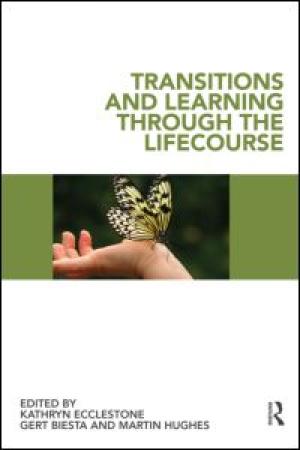
Like many ideas that inform policy, practice and research, ‘transition’ has many meanings. Children make a transition to adulthood, pupils move from primary to secondary school, and there is then a movement from school to work, training or further education. Transitions can lead to profound and positive change and be an impetus for new learning for some individuals and be unsettling, difficult and unproductive for others. Transitions have become a key concern for policy makers and the subject of numerous policy changes over the past ten years. They are also of interest to researchers and professionals working with different groups. Transitions and Learning Through the Lifecourse examines transitions across a range of education, life and work settings. It explores the claim that successful transitions are essential for educational inclusion, social achievement, and economic prosperity and that individuals and institutions need to manage them more effectively. Aimed primarily at academic researchers and students at all levels of study across a range of disciplines, including education, careers studies, sociology, feminist and cultural studies, this book is the first systematic attempt to bring together and evaluate insights about educational, life and work transitions from a range of different fields of research. Contributions include: The transition between home and school The effects of gender, class and age Transitions to further and higher education Transitions for students with disabilities Transitions into the workplace Learning within the workplace Approaches to managing transitions (From the Publisher)
Part of a Pew Research Center series of reports exploring the behaviors, values and opinions of the teens and twenty-somethings that make up the Millennial Generation
Key Findings from the First National Longitudinal Study of Undergraduates' Spiritual Growth, conducted by the Higher Education Research Institute (HERI) at UCLA www.spirtuality.ucla.edu
Two troublesome portraits of religious studies professors often exist in the minds of some students at any given time: the Guru, or wise spiritual teacher, and the Deceiver. These metaphors capture student perceptions of us that may be ill-informed and beyond our control. We will examine and compare how our own chosen metaphors for teaching – theological typologist and neutral enthusiast – respond creatively to the unchosen metaphors of guru or deceiver. We cannot avoid being cast as gurus/deceivers, but we can discern how our own metaphors for teaching engage "unchosen" student metaphors for us. This exercise can enhance our self-awareness about our own normative agendas in the classroom, and help to sharpen colleagues' conversations about our sometimes differing assumptions regarding the discipline and teaching of religious studies.
Teaching a required introductory Bible course to non-majors at a church-related college presents a number of pedagogical challenges. When considering how to teach such a course in the context of concerns common to the liberal arts, I find myself reflecting on authority. My thoughts on the teaching of this course in my own context are organized around authority understood as a developmental issue, an educational issue, and a religious issue. In each case, I seek to use my discipline and the primary and secondary materials of the course as occasions for the development of capacities that will contribute to the life of students as critical thinkers, creative problem-solvers, and responsible global citizens.
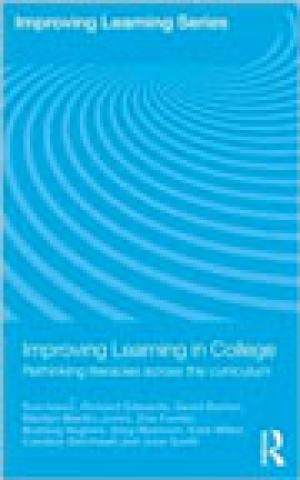
What's the problem with literacy at college? How might everyday literacy be harnessed for educational ends? Based on the first major study of literacy practices in colleges in the UK, this book explores the reading and writing associated with learning subjects across the college curriculum. It investigates literacy practices in which students engage outside of college, and teaching and learning strategies through which these can help support the curriculum. With insightful analyses of innovative practices, it considers ways of changing teaching practices to enable students to draw upon their full potential. Recent research work has challenged the myth of individual student deficit, arguing cogently that people have ‘funds of knowledge’ from diverse and vibrant cultural roots, and that these have been misguidedly disqualified by the education system. It has claimed that different ‘ways with words’ can provide valuable resources for learning. However, the empirical exploration of this claim has lagged far behind the theoretical debate. Improving Learning in College resolves this by showing the integrity and richness of the literacy practices of a significant population, not previously the focus of such research: those who take vocational and academic college courses in colleges. It addresses an issue which has not until now been developed within this research tradition: that of how these practices can not only be valued and validated, but mobilised and harnessed to enhance learning in educational settings. This book will interest all teachers, teacher-educators and researchers concerned with post-compulsory education and vocational education in compulsory schooling. (From the Publisher)
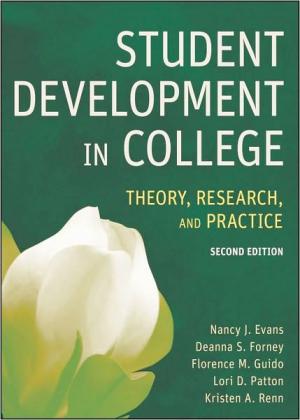
The second edition of Student Development in College offers higher education professionals a clear understanding of the developmental challenges facing today's college students. Thoroughly revised and updated, this edition includes new integrative theories of student development, expanded coverage of social identity theories, a targeted focus on higher education-related research, a current review of student development research and application, and reconceptualization of typology theories as a way to understand individual differences. Praise for the Second Edition of Student Development in College Student Development in College is a rich, comprehensive exploration of the major theoretical perspectives that inform development. The authors' attention to nuances and complexities results in a substantive history of theory development and a careful story about how various perspectives evolved yielding contemporary theorizing. The book is a masterful blend of theoretical lenses and their use in designing developmentally appropriate practice for diverse populations of contemporary college students. It is an excellent resource for all educators who work on college campuses. (From the Publisher)
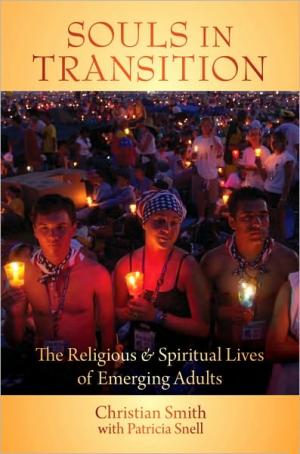
How important is religion for young people in America today? What are the major influences on their developing spiritual lives? How do their religious beliefs and practices change as young people enter into adulthood? Christian Smith's Souls in Transition explores these questions and many others as it tells the definitive story of the religious and spiritual lives of emerging adults, ages 18 to 24, in the U.S. today. This is the much-anticipated follow-up study to the landmark book, Soul Searching: The Religious and Spiritual Lives of American Teenagers. Based on candid interviews with thousands of young people tracked over a five-year period, Souls in Transition reveals how the religious practices of the teenagers portrayed in Soul Searching have been strengthened, challenged, and often changed as they have moved into adulthood. The book vividly describes as well the broader cultural world of today's emerging adults, how that culture shapes their religious outlooks, and what the consequences are for religious faith and practice in America more generally. Some of Smith's findings are surprising. Parents turn out to be the single most important influence on the religious outcomes in the lives of young adults. On the other hand, teenage participation in evangelization missions and youth groups does not predict a high level of religiosity just a few years later. Moreover, the common wisdom that religiosity declines sharply during the young adult years is shown to be greatly exaggerated. Painstakingly researched and filled with remarkable findings, Souls in Transition will be essential reading for youth ministers, pastors, parents, teachers and students at church-relatedschools, and anyone who wishes to know how religious practice is affected by the transition into adulthood in America today. (From the Publisher)
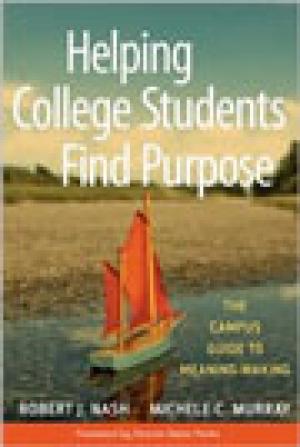
Praise for Helping College Students Find Purpose A generous and inspiring book! In the spirit of 'convocation,' Nash and Murray call together both university faculty and student affairs professionals to provide them new means for helping more college students realize the highest purpose of higher education—that, in pursuing the means to make a living, one comes to make a meaning worth living for. Educators across campuses—faculty and administrators alike—will find in this book not only the importance of helping their students construct meaning upon which to base their academic and life ambitions, but also practical suggestions for doing so. Ultimately, those who will benefit most from this book are students whose education inside and outside the classroom is informed by the type of cross-campus, interdisciplinary approach to meaning-making put forth by the authors. This comprehensive compendium is a must-read for any higher education professional interested in responding to students' ubiquitous concerns about existential issues concerning purpose and meaning. It brings together classical and contemporary thought, conceptual depth, and concrete suggestions for practice. This scholarship is enriched and enlivened by the authors' personal perspectives and experiences, and by student voices and vignettes. Buy it and keep it handy as a source of wisdom and good counsel. A thoughtful, provocative, moving, yet practical guide for any teacher seeking to make the college classroom a space for inspiration and hope. (From the Publisher)
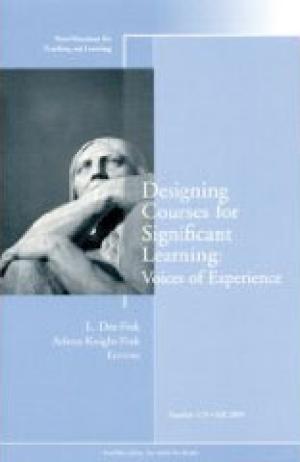
Higher education today is being called on to deliver a new and more powerful kind of education, one that prepares students to be more engaged citizens, better equipped to solve complex problems at work and better prepared to lead meaningful lives individually. To respond to this call, teachers in colleges and universities need to learn how to design more powerful kinds of learning into their courses. In 2003, Dee Fink published a seminal book, Creating Significant Learning Experiences, that offered teachers two major tools for meeting this need: the Taxonomy of Significant Learning and the model of Integrated Course Design. Since that time, educators around the world have found Finks ideas both visionary and inspiring. This issue of New Directions for Teaching and Learning contains multiple stories of how college-level teachers have used these ideas in a variety of teaching situations, with subject matter ranging from the sciences to the humanities. Their conclusion? The ideas in Finks book truly make a difference. When used properly, they lead to major improvements in the level of student engagement and the quality of student learning! This is the 119th volume of the Jossey-Bass higher education quarterly report series New Directions for Teaching and Learning, which offers a comprehensive range of ideas and techniques for improving college teaching based on the experience of seasoned instructors and the latest findings of educational and psychological researchers. (From the Publisher)